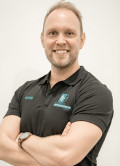
Patrick
Principal Physiotherapist Patrick shares his story after being diagnosed with a 2.1cm tumour that grew off his 8th cranial nerve - a 'Vestibular Schwanomma'
Archer St Physio is going Grey for May!
Our Principal Physiotherapist, Patrick is sharing his story to help raise awareness and fundraise for Brain Tumour Awareness Month
Donate to the appeal here
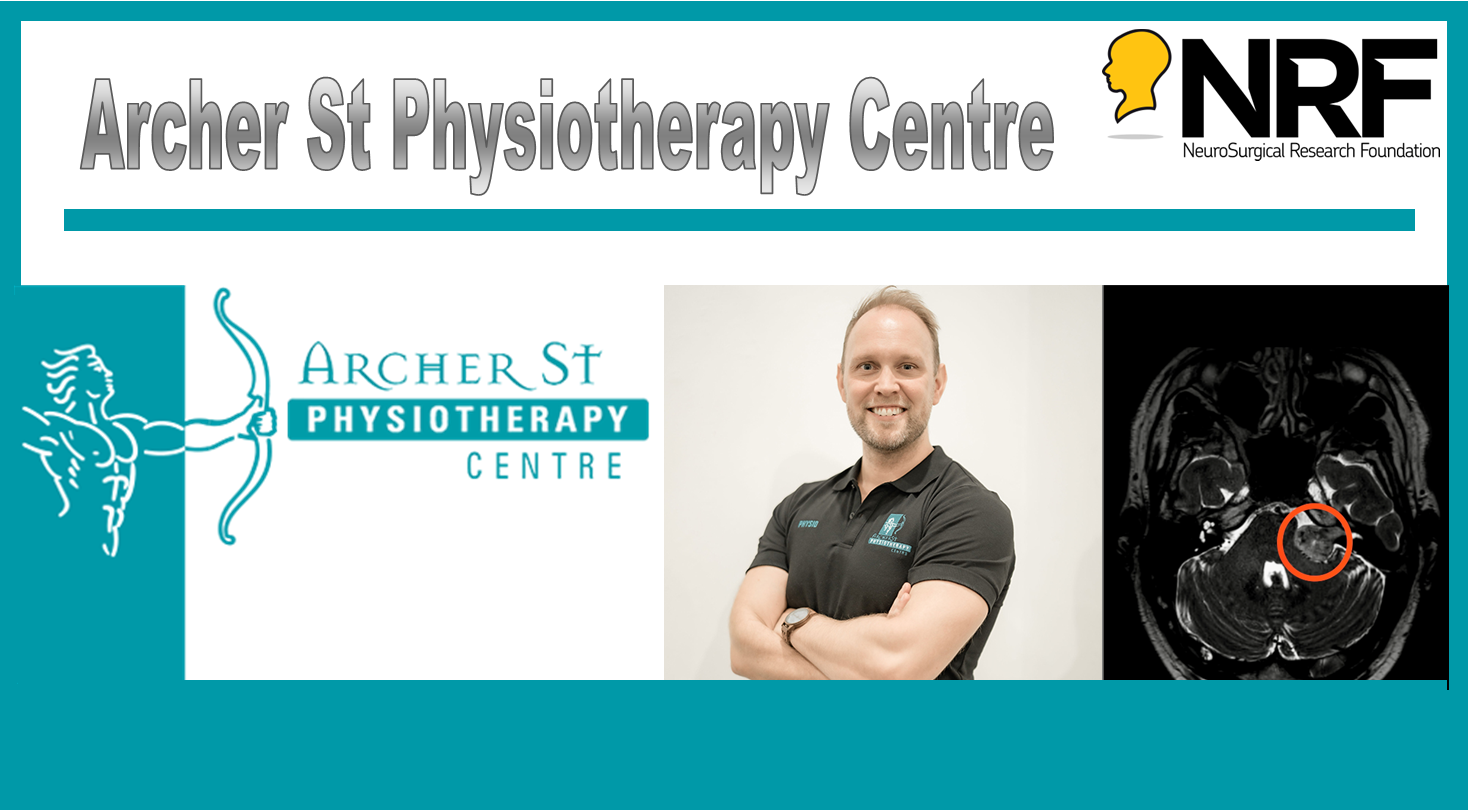
In late June 2022, I woke up one morning with an obvious hearing loss in my left ear. Everything was muffled, like being underwater, and there was an uncomfortable feeling of fullness in my ear canal, accompanied with ever increasing tinnitus.
Concerned, I made an appointment with an audiologist at Lions Hearing Clinic in East Victoria Park. After a thorough investigation, they confirmed my hearing in my left ear was considerably reduced and were concerned that I had a condition called ‘Sudden Sensironeural Hearing Loss’, which is a medical emergency where hearing is spontaneously lost. I was put on high doses of steroid medication from my GP, sent to an ENT specialist at Murdoch Hospital who confirmed the diagnosis, and immediately started daily 3 hour sessions in Hyperbaric Chambers at Fiona Stanley Hospital along with steroid injections through the ear drum. The hyperbaric chamber is used to administer pure oxygen at increased atmospheric pressures, with research showing this to be useful to save sudden hearing loss. After 3 weeks of daily hyperbaric chamber sessions, an MRI head scan result showed I didn’t have sudden hearing loss, but instead, showed I had a more sinister, surprising and rarer cause to my hearing loss – a rare but potentially life threatening brain tumour.
I was diagnosed with a “Vestibular Schwanomma”, a 2.1cm tumour that grew off my 8th cranial nerve – the Vestibulocochlear nerve – which controls hearing and balance, explaining why my hearing was so affected as the nerve was more and more crushed by the tumour. It was also compressing my brain stem, and classed as a ‘large’ tumour, it had to be treated, before its continual growth caused compression on surrounding vitals structures, called “mass effect”.
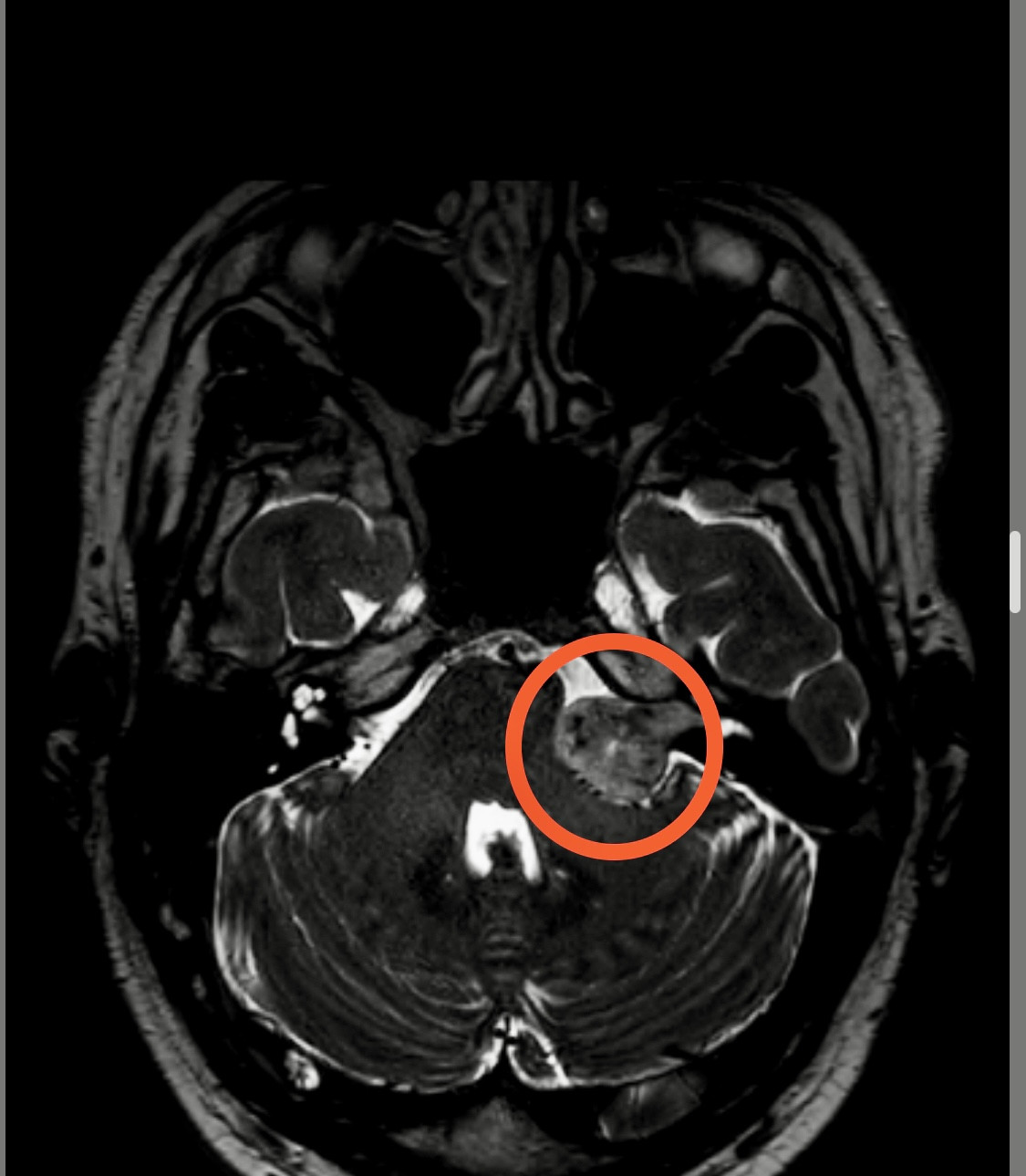
Over the next 5 months I saw numerous specialists and surgeons, for multiple opinions, to determine the best course of action. Would it need to be surgically removed? Would I need Radiation therapy instead? Each option had its own pros and cons, and also came with a list of serious consequences, such as facial paralysis or secondary malignancy, which made choosing the right treatment option extremely nerve racking and difficult. All the while, my symptoms were getting worse, including – increased headaches, loss of balance, hearing diminishing, facial numbness, loss of taste, eye muscles spasms and horrible tinnitus becoming louder and more unbearable. The tinnitus sounded like a smoke alarm, ambulance, radio feedback and screaming children all at once!
A follow up MRI head scan in January confirmed the tumour was growing rapidly – over 4 years worth of growth in just 6 months – and at now 2.5cm in size, my treatment options were reduced to only one – surgical removal – as radiation would cause too much swelling and pressure onto the brain stem.
In late February, I underwent a craniotomy at Hollywood Private Hospital where a Neurosurgeon, Professor Stephen Lewis, and an ENT Surgeon, Mr Stephen Rodrigues, together took 5 hours to remove the tumour from the depths of my skull, being careful to not injure surrounding structures, in particular the brain stem and other cranial nerves. During surgery, electrical activity through my cranial nerve were monitored, and I also had a chunk of fat removed from my buttock and inserted into my brain to act as a plug – so glamourous! I spent 2 days in ICU, before being transferred to a normal hospital ward to recover for a week. Recovery was difficult, with vomiting, fatigue, headache and severe pain being the major symptoms.
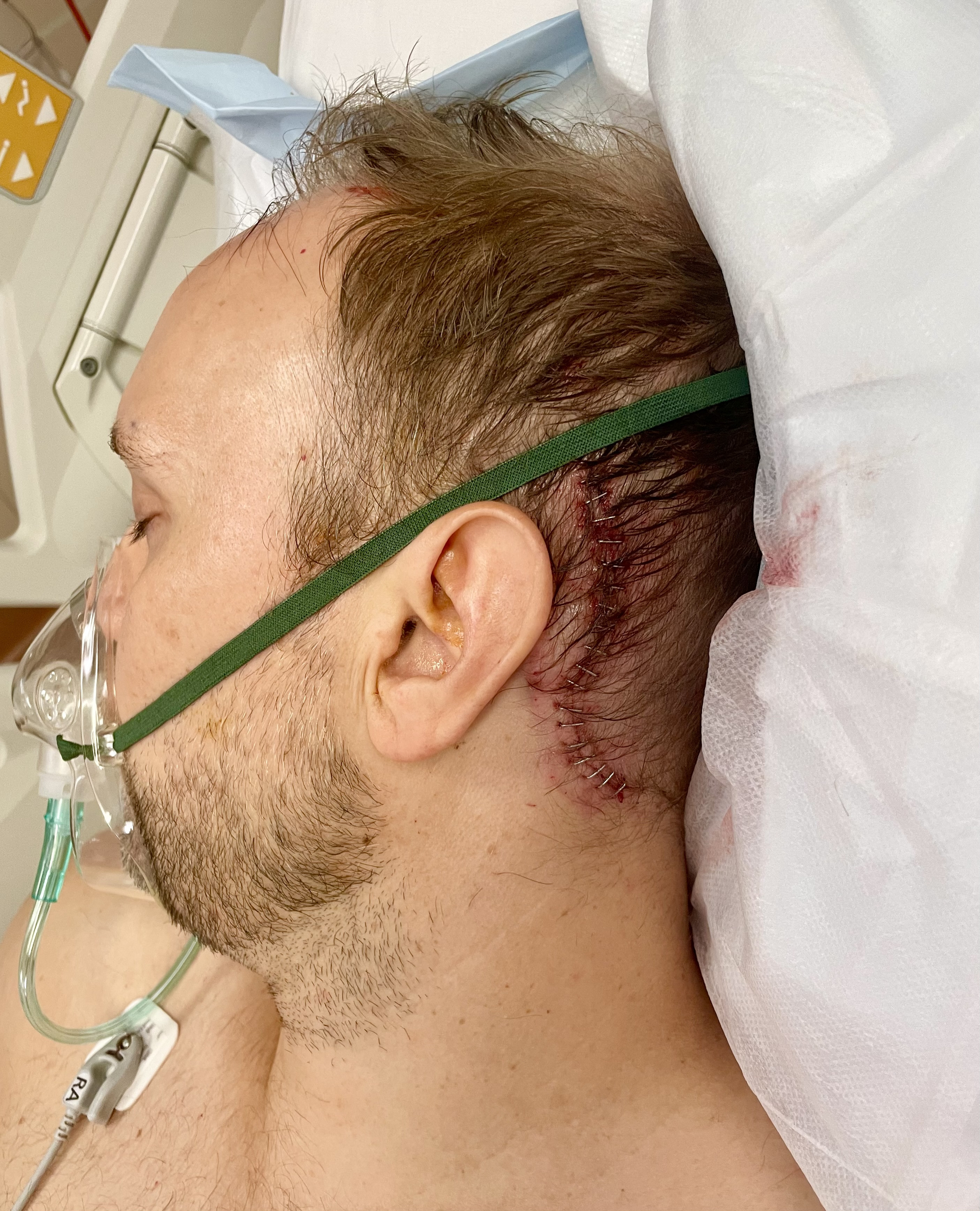
The surgery was a success, with both surgeons being pleased and confident that they removed the tumour. As a consequence, I am unfortunately completely deaf on my left side as the entire 8th nerve had to be surgically removed with the tumour, removing my auditory and balance structures. I had to learn to rely on my unaffected right side for balance, learning to walk and be stable again, without dizziness, as my right side “kicked in” to take over control for both sides. The tumour had considerably stretched and placed pressure on my facial nerve, causing me to have facial paralysis down the entire left side of my face and neck. This is hopefully only temporary, but may take many months to recover. It’s made speaking, eating, and communicating quite difficult. Fingers crossed it returns soon, and I will be able to smile again.
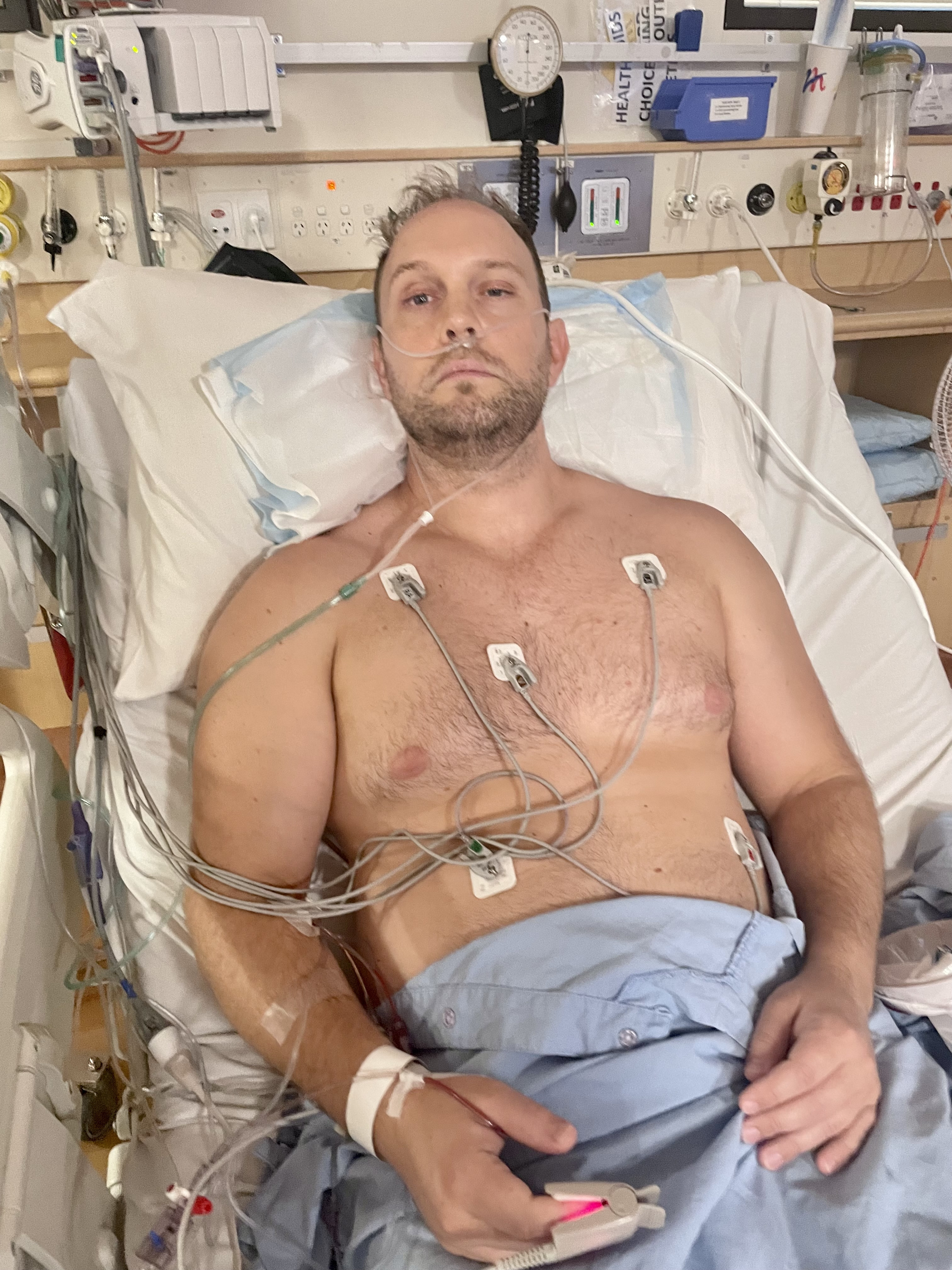
Upon diagnosis, and post surgery, no one really talks about the added stresses and necessary supplementary appointments needed in your life. I’ve seen specialist physiotherapists to assist with my balance and dizziness retraining; optometrists to deal with terrible dry eye symptoms due to being unable to blink or produce tears; facial specialists to assist with facial muscle reanimation and movement; audiologists to investigate the potential use of hearing aids; psychologists to deal with stress, anxiety, depression and the feeling of loss, post surgery; and follow ups with both surgeons for review and to remove the 18 staples from my wound – now a scar, a daily reminded of this ordeal. There will be many more follow ups to come, including regular MRI scans to ensure the tumour has been completely removed, and doesn’t grow back – which would mean needing Radiation treatment. It’s throughout this chaos that one truly is thankful for our incredible medical system in Australia, and everyone that’s involved in addressing all of these symptoms and medical issues. It’s something I am equally amazed and thankful for.
I am also thankful for the support I have from family, friends and work colleagues. There’s nothing quite like a brain tumour that shows how loved and supported one actually is. Whether it was visits, meals, flowers, gifts, cards or just well wishes and text messages – it all helped, and made me feel better just knowing I wasn’t alone.
There’s still a long way to go in regards to recovery. It could take years according to some people. I’m concentrating on getting my strength, endurance, and mobility back. The little things, like being able to return to work full time without feeling fatigued by midday, are the goals. The big thing is getting my face moving again. Upon reflection, throughout all of this, the fear of the unknown is the worst. The mind wanders down dark paths of what might be. The stress, anxiety, financial pressures, all take their toll as much as the physical pressures of recovery and rehabilitation. Things like preparing Wills and Estate Planning were definitely reality checks along the way.
The silver lining is a new outlook on life. Knowing that you can survive something reasonably impactful shows the tenacity and tolerance of the human body. I’m still learning to cut myself some slack in life, and give myself time to mend, but I know the “mid life crisis” of brain surgery will ultimately change my outlook on everything moving forward. It sounds like such a cliché, but it really does make you look at life differently and make you take stock about what’s really important, and to not be so hard on oneself. I know the light at the end of the tunnel looks bright and I’m thankful for that.




